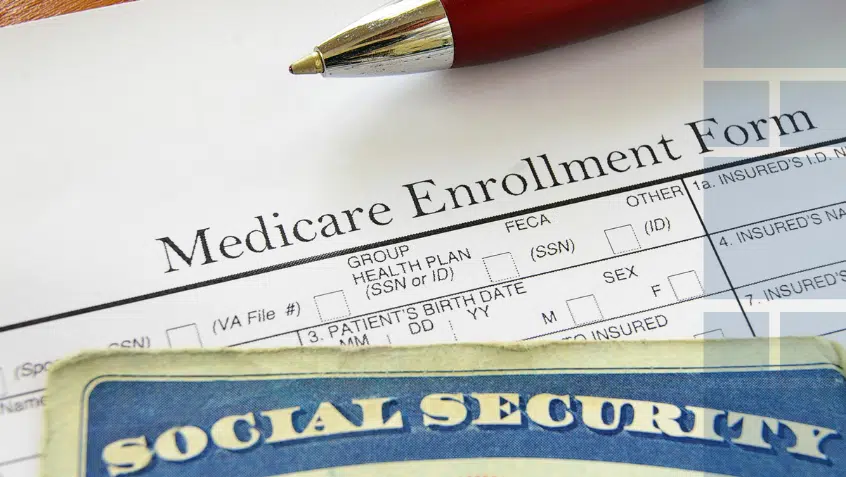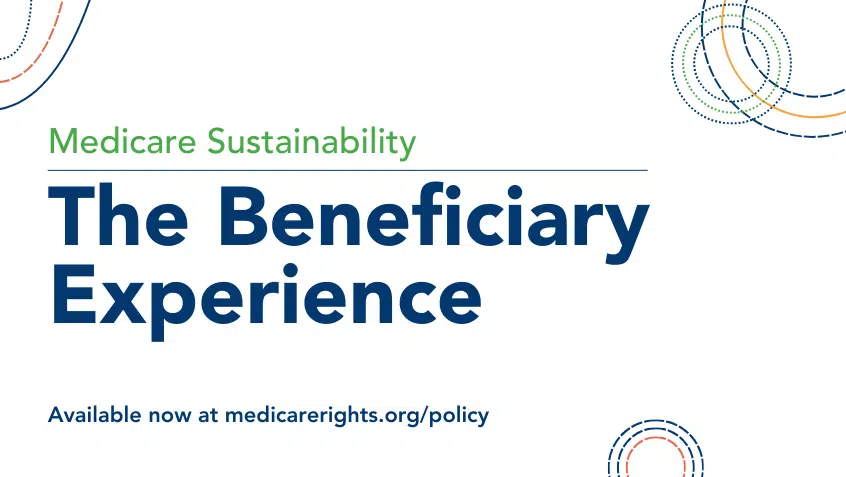Join Us Live for a Discussion on Medicare, Democracy, and the Future of Health Care
Several Key Health Bills Included in Recent Congressional Action to Address the Pandemic and Fund the Government

At the end of 2020, Congress passed sweeping legislation addressing the COVID-19 public health emergency, updating Medicare and Medicaid policies, funding the federal government for the rest of the fiscal year, and extending essential health care programs.
While the bill’s COVID-19 relief was necessary and important to ensure equitable access to needed health and economic supports for all Americans in the coming months, Congress and the Biden administration must do more to meet these pressing needs.
As Medicare Rights outlined in our transition memo to then President-elect Biden, policymakers can take steps to immediately respond to COVID-19 in ways that prioritize older adults and people with disabilities. This includes reinstating COVID-19 related Medicare enrollment flexibilities; ensuring access to affordable care, treatment, and vaccines; providing needed economic relief; promoting health, safety, and quality of life in nursing homes; and supporting increased funding for Medicaid and other community living programs.
Below are summaries of key Medicare, Medicaid, and COVID-19 provisions from the legislation.
Medicare
Modernizes Medicare Enrollment
The legislation includes several BENES Act reforms, updating the Medicare enrollment rules for the first time in over 50 years. The adopted BENES Act policies will modernize Medicare enrollment in several important ways:
- The bill eliminates the up to seven month-long wait for coverage that people can experience when they sign up for Medicare during the General Enrollment Period (GEP) or in the later months of their Initial Enrollment Period (IEP). Beginning in 2023, Medicare coverage will begin the month after enrollment.
- It reduces barriers to care by expanding Medicare’s authority to grant a Special Enrollment Period (SEP) for “exceptional circumstances.” A long-standing flexibility within Medicare Advantage and Part D, in 2023 this critical tool will be available to facilitate enrollments program-wide, enhancing beneficiary access and administrative consistency.
- To further maximize coverage continuity and ease transitions to Medicare, the bill directs the U.S. Department of Health and Human Services (HHS) to identify ways to align Medicare’s annual enrollment periods. HHS is to present these findings in a report to Congress by January 1, 2023.
Extends Low-Income Outreach and Assistance Activities
The bill authorizes funding for community-based organizations to conduct low-income outreach, enrollment, and education activities for three years, at $50 million per year. Initially authorized in 2009 by the Medicare Improvements for Patients and Providers Act (MIPPA), the program has helped nearly three million low-income Medicare beneficiaries apply for and obtain assistance that makes their health care and prescription drugs more affordable.
Makes Transitional Part D Coverage for Low-Income Beneficiaries Permanent
It makes the Limited Income Newly Eligible Transition (LI NET) program permanent, effective January 1, 2024. LI NET helps low-income Medicare beneficiaries access the care they need, by providing them with temporary prescription drug coverage while they apply for Medicare Part D. It applies retroactively for dual eligible individuals and those that receive benefits under the Supplemental Security Income program.
Expands Access to Mental Telehealth Services
It also expands access to telehealth services in Medicare to allow beneficiaries to receive mental health services via telehealth, including from the beneficiary’s home. To be eligible to receive these services via telehealth, the beneficiary must have been seen in person at least once by the physician or non-physician practitioner during the six-month period prior to the first telehealth service, with additional face-to-face requirements determined by the Secretary.
Continues the Independence at Home Demonstration
The package extends the Independence at Home demonstration for three additional years, through 2023, and grows the demonstration by 5,000 beneficiaries—from 15,000 to 20,000.
Improves Coverage of Immunosuppressive Drugs for Kidney Transplant Patients
Current Medicare policy limits coverage of immunosuppressive drugs for kidney transplant patients to 36 months. People who need the medications beyond that timeframe may not be able to afford them and can experience worse health outcomes and lower transplant success rates as a result. The year-end package contains a solution. Beginning in 2023, patients whose coverage under Medicare Part A would otherwise end post-transplant, and whose drugs are not covered by other insurance, can have their immunosuppressive drugs covered under Part B. This provision is expected to save Medicare $400 million over 10 years, largely by averting the return of transplant patients to dialysis.
Waives Medicare Co-insurance for Certain Colorectal Cancer Screening Tests
The bill gradually decreases the current 20% cost-sharing that Medicare beneficiaries pay for colorectal screening tests where a polyp is detected and removed.
Continues Coverage of Certain Temporary Transitional Home Infusion Therapy Services
The legislation ensures Medicare will continue to cover certain temporary transitional home infusion therapies (self-administered and biological drugs) when the permanent home infusion therapy benefit takes effect.
Extends the Medicare IVIG Treatment Demonstration
It also continues the Intravenous Immunoglobulin (IVIG) treatment demonstration through 2023 and expands it, allowing to up to 2,500 additional Medicare beneficiaries with primary immunodeficiency diseases (PIDD) to participate.
Increases the Use of Real-time Benefit Tools
The package directs Medicare Advantage and Part D plans to implement real-time benefit tools that can integrate with electronic prescribing and electronic health record (EHR) systems, which provide benefit and cost-sharing information to prescribing professionals.
Allows Occupational Therapists to Conduct Certain Home Health Assessments
The bill requires the Secretary of HHS, no later than January 1, 2022, to allow occupational therapists to conduct initial assessment visits and complete comprehensive assessments for certain home health services, if the referral order by the physician does not include skilled nursing care but does include occupational therapy and physical therapy or speech language pathology. This makes permanent a current pandemic-related 1135 waiver flexibility.
Improves Access to Skilled Nursing Facility (SNF) Services for People with Hemophilia
It adds blood clotting factors and items and services related to their furnishing to the categories of high-cost, low-probability services that are excluded from the SNF per diem payment system and are separately payable. This change will allow SNF care to be an option for beneficiaries with hemophilia.
Medicaid
Extends the Money Follows the Person Rebalancing Demonstration
The bill funds the Medicaid Money Follows the Person (MFP) program at $450 million a year through 2023, lowers the institutional residency period from 90 days to 60 days, and requires states to provide additional information on their use of the funds.
Extends Spousal Impoverishment Protections
In another health care “extender” provision, the bill continues, through 2023, spousal impoverishment protections for people whose partners are receiving Medicaid home and community-based services.
Requires Coverage of Non-Emergency Transportation
The legislation codifies non-emergency medical transportation (NEMT) as a statutorily-mandated Medicaid benefit, strengthening access to this critical service.
Restores Medicaid Coverage for Citizens of Freely Associated States
It also restores Medicaid eligibility for citizens of the Freely Associated States (the Federated States of Micronesia, the Republic of the Marshall Islands, and the Republic of Palau) lawfully residing in the United States under the Compacts of Free Association.
Covers Routine Costs of Life-saving Therapies
Starting January 1, 2022, the bill requires Medicaid to cover routine patient costs for items and services that are provided in connection with a qualifying clinical trial regarding serious or other life-threatening conditions, including treating complications from such studies.
COVID-19
Vaccines and Testing
The relief package includes $69 billion for COVID-19 vaccines, testing, and tracing. $9 billion of that will go to the Centers for Disease Control and Prevention (CDC) and states for vaccine distribution, including $400 million for vaccine allocation to high risk and underserved areas, including communities of color. Another $22 billion will help states fund testing, tracing, and COVID mitigation programs. Of that amount, $2.5 billion will be allocated to underserved communities through grants. The remaining funding will support vaccine research and development, efforts to build the stockpile of vaccine supplies, mental health services, and the Indian Health Service.
Stimulus Payments
The bill also contains scaled-back individual economic relief payments. People with adjusted gross incomes up to $75,000 ($150,000 married filing jointly) in 2019 will be eligible for a $600 rebate ($1,200 married). The rebate amount phases out by $5 for every $100 above this limit, and completely at $87,000 ($174,000 married). Families will receive an additional $600 for each child—but not adult—dependent.
Unemployment Insurance
The legislation partially renews the $600 increase in unemployment compensation (UC) benefits that expired in July, by providing an additional $300 a week through March 14, 2021.
Paid Leave
Unlike the Families First Coronavirus Response Act, the new relief bill does not require employers to provide employees with paid leave for COVID-19-related reasons. Instead, it allows employers to do so through March 31, 2021 in exchange for a payroll tax credit.
Show Comments
We welcome thoughtful, respectful discussion on our website. To maintain a safe and constructive environment, comments that include profanity or violent, threatening language will be hidden. We may ban commentors who repeatedly cross these guidelines.
Help Us Protect & Strengthen Medicare.
Donate today and make a lasting impact.
The Latest
Most Read
Add Medicare to Your Inbox
Sign up to receive Medicare news, policy developments, and other useful updates from the Medicare Rights.
View this profile on InstagramMedicare Rights Center (@medicarerights) • Instagram photos and videos









